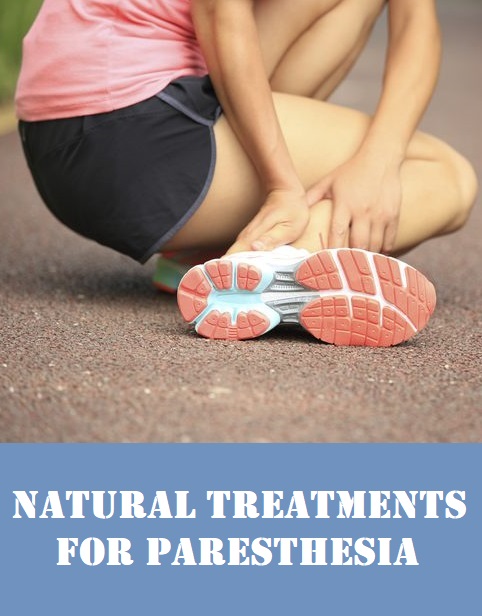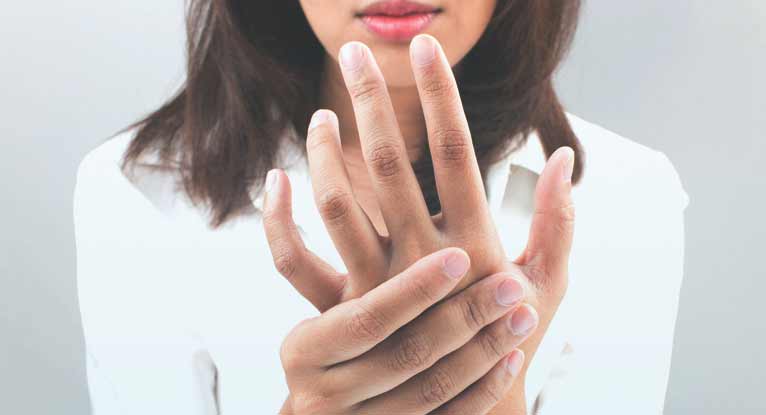How to Get Rid of Paresthesia?: Paresthesia is a common disease that can develop in any part of the body at any time. If you experience itching or numbness for no apparent reason or feel like your skin is crawling, it is a clear symptom of this condition. While it can occur anywhere in the body, paresthesia most often affects the arms, hands, feet, and legs, and it can be chronic or temporary. The good news is that this disease can be treated with natural remedies. These remedies may be slow and gradual but their effects on the body are permanent, making them the ideal treatment for paresthesia.

10 Home Remedies to Help You Get Rid of Paresthesia Naturally
Here is a look at some of the best natural treatments you can use to get rid of paresthesia:
1. Warm Compress
If you have acute paresthesia, one of the best ways to treat it naturally is by using a warm compress. It helps in increasing the supply of blood to the affected area and providing instant relief from the discomfort you experience from this condition. A heating pad or a warm shower can also help in alleviating the symptoms of paresthesia.
- Soak a clean, soft cloth in warm water and wring it to get rid of the excess.
- Place the warm cloth on the affected area for 5 to 7 minutes.
- Repeat the process several times a day until you get relief from the numbness and discomfort that come with paresthesia.
Related: How to Get Rid of Keratosis Pilaris? – Home Remedies for Chicken Skin
2. Massage
You can get rid of paresthesia with regular massage, with or without oil. It boosts blood circulation and this in turn helps in reducing the symptoms of the condition. A massage also stimulates the nerves and ensures that they function properly. Massage the affected area regularly to alleviate the symptoms of paresthesia that you experience.
- Heat up some mustard, coconut or olive oil.
- Let it cool until it is warm and apply on the affected area.
- With firm fingers, massage the area in circular motions for a minimum of 5 minutes.
- Repeat 4 to 5 times a day until you do not experience any symptoms.
- You can use the same massage technique without oil too.
Related: How to Get Rid of Angular Cheilitis with Home Remedies?; 7 Methods
3. Exercise
Basic stretches and exercise can effectively help with paresthesia as they also helps boost blood circulation. Regular exercise also helps in improving mobility and preventing a number of different health issues. It is said that people with diabetes have a higher risk for paresthesia. This is why it is particularly important for them to exercise regularly as physical activity can help in controlling blood sugar levels.
- Go for a 30-minute walk 2 times a day.
- Swimming, jogging and bicycling regularly are also great ways to improve blood circulation.
- Aerobic exercises and cardiovascular workouts for 30 minutes a day will help reduce the symptoms. Do this 5 times a week.
- Yoga is another excellent way to treat paresthesia. However, you should make sure that you learn how to do the postures correctly.
Related: 6 Home Remedies to Get Rid of Mold Allergies & Prevent Its Recurrence
4. Castor Oil Pack
Another effective natural treatment to get rid of paresthesia is castor oil. It penetrates deep into the tissues and helps in alleviating the discomfort you experience with this condition. Castor oil packs are also known to have a balancing effect on the nervous system.
- Soak a soft cloth with castor oil.
- Wrap it loosely around the affected area and cover with a plastic wrap.
- Place a heating pad over the castor oil pack for 20 to 30 minutes.
- Remove the pad and leave the castor oil pack on for a few hours, or overnight.
- Do this 4 or 5 times a week for best results.
Related: 7 Natural and Mild Home Remedies for Hidradenitis Suppurativa
5. Magnesium
In order to function properly, your nervous system requires an adequate amount of the essential mineral, magnesium. In fact, low levels of this mineral in the body is one of the causes of paresthesia. Magnesium helps prevent any type of nerve damage. It also stimulates the circulation of blood in the body.
- Include more foods rich in magnesium in your regular diet, including dark green vegetables, bananas, soybeans, oatmeal, nuts and seeds, avocados, peanut butter, low-fat yogurt, dark chocolate and cold-water fish.
- Soak in a bath with warm water and Epsom salt for 20 minutes or so. Do this 3 times a week to get relief from the symptoms of the condition.
- You can also take magnesium supplements. Consult your doctor before doing so to find out the correct dosage.
Related: Discover Top 6 Home Remedies Used to Get Rid of Folliculitis
6. B Vitamins
Vitamin B1, Vitamin B5 and Vitamin B12 are equally important when you suffer from paresthesia. Vitamin B1 contains thiamine whose deficiency can result in the pricking or numbness that you feel when you have this condition. Vitamin B12 helps boost nerve function and relieve the symptoms of paresthesia, like the tickling or burning sensation.
- Include foods rich in B Vitamins to your daily diet, including peanuts, almonds, cashews, walnuts, soy, wheat bran, wheat germ, broccoli, hazelnuts, tuna, sardines, eggs, cheese, beef, mushrooms, lima beans, oysters and yeast, to name a few.
- You can also take B Vitamin supplements to make sure that you meet your daily requirements. However, you should consult your doctor before doing so.
Related: Guidelines and Home Remedies to Help You Get Rid of Jaw Pain
7. Ginger Tea
Ginger is a powerful herb that helps in improving blood circulation and hence can get rid of paresthesia. The compounds that it contains have a warming effect on the body, which leads to better circulation of blood. Ginger also helps in stimulating the nervous system.
- Cut a piece of ginger into several thin slices.
- Boil 1 tablespoon of the slices in 2 cups of water for 10 minutes.
- Strain, add a bit of honey to improve the taste and drink the tea.
- Drink ginger tea 2 to 3 times a day until you get the desired result.
- You can also take ginger supplements, but consult your doctor before doing so.
Related: 8 Easy Home Remedies to Help Every Mom Deal with Postpartum Hives
8. Acupuncture
A part of traditional Chinese medicine that has been used for centuries, acupuncture is an excellent treatment paresthesia. In this treatment, the expert will insert thin needles in and around the affected area. This will helps in addressing the cause of the abnormal sensations you feel when you have this condition. Acupuncture focuses on certain acu-points which are stimulated to boost blood circulation throughout the body. However, please make sure that you visit a licensed acupuncturist to get the procedure done. Keep in mind that you will need to go for a few sessions to treat the problem and resolve it.
Related: 6 Home Remedies for Dyshidrotic Eczema to Keep It Under Control
9. Homeopathy
If you have skin paresthesia and the subtle forms of the condition, you should go to a homeopathic doctor so that you can be prescribed homeopathic medicines to treat the disease. While homeopathy can be a slow and gradual treatment, keep in mind that it is extremely effective and treats the condition from the root. The fact is that homeopathy can treat a wide range of diseases and illnesses, and if you suffer from paresthesia, it is one of the safest and most affordable ways to treat it medically.
Related: 7 Mild and Natural Home Remedies for Plantar Fasciitis
10. Inositol
Foods that are rich in inositol should be taken regularly to get rid of paresthesia naturally. Including these foods in your daily diet can do wonders in relieving the symptoms you experience. Apart from treating this disease, inositol-rich foods also help in the treatment of diabetes, depression and panic attacks. Whole grains and legumes are some of the foods rich in this nutrient. You can also take inositol supplements to help with your condition. However, you should consult your doctor first to get the right dosage.
Related: How to Stop Eye Twitching? 7 Natural Remedies to Stop Eye Twitching
As you can see, there are many natural treatments to get rid of paresthesia. They are safe and you do not have to worry about adverse side effects. However, if your condition exacerbates, you should visit a physician as the only alternative may be surgery. Consult your doctor with all your medical records to determine if you need surgery.
